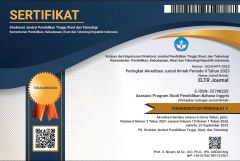WORTHY OR NOT? TEACHING ENGLISH TO YOUNG INDONESIAN LEARNERS USING TECHNOLOGY IN THE CLASSROOM
Abstrak terlihat: 356 / PDF terunduh: 362DOI:
https://doi.org/10.37147/eltr.v4i1.35Keywords:
classroom, teachers, technologyAbstract
Indonesia is one of the seven countries that the principals informed the lack of infrastructure and educational materials. The Indonesian government is improving all aspects of the education. The use of technology in the classroom has been concerned as it is one of the criteria in OECD rank. In this study, we explore the use of technology in the classroom from in-service teachers’ (n = 20, male = 2, female = 18) perspectives. The data were collected with a web-based survey with some open-ended questions which allow the researcher to detect the teachers’ responses. The findings report that some of the teachers use technology to deliver learning and to attract their students. The others may prefer to deliver teaching without technology to make the students experience the real things. Meanwhile, some combine the use of technology and realia to make the students grab the materials easily and to deliver meaningful learning to the students. The study suggests that the government should not only emphasize the improvement in technology and educational infrastructure. The government should also provide training for the teachers which help the teachers to be more creative in using real things around them.
Downloads
References
Learning.
Bryk, A., & Schneider, B. (2002). Trust in schools: A core resource for
improvement. Russell Sage Foundation: New York City.
Burke, S. C., Snyder, S., & Rager, R. C. (2009). An assessment of faculty usage
of YouTube as a teaching resource. Internet Journal of Allied Health Sciences
and Practice, 7(1), 8.
Charles, C. (2017). An entrepreneurial adventure? Young women pre-service
teachers in remote Aboriginal Australia. Teaching and Teacher Education,
61, 179-188.
Al-Tamimi, A., & Shuib, M. (2009). Motivation and attitudes towards learning
English: A study of petroleum engineering undergraduates at Hadhramout
University of Sciences and Technology. GEMA Online Journal of Language
Studies, 9(2), 29–55.
Charteris, J., & Smardon, D. (2015). Teacher agency and dialogic feedback:
Using classroom data for practitioner inquiry. Teaching and Teacher
Education. https://doi.org/10.1016/j.tate.2015.05.006
Ebersöhn, L., & Loots, T. (2017). Teacher agency in challenging contexts as a
consequence of social support and resource management. International
Journal of Educational Development, 53, 80–91.
https://doi.org/10.1016/j.ijedudev.2016.11.005
Iii, V. (2017). PISA 2015 Results, 3(3). https://doi.org/10.1787/9789264273856-
en
Kayi-Aydar, H. (2015). Teacher agency, positioning, and English language
learners: Voices of pre-service classroom teachers. Teaching and Teacher
Education, 45, 94–103. https://doi.org/10.1016/j.tate.2014.09.009
Lia, L. (2013). MULTIMEDIA INTERAKTIF SEBAGAI SALAH SATU
SAINS, 132–140.
Moon, J. (2005). Special features, (October), 30–34.
Pope, C. A., Kutiper, K. L., & Kutiper, K. L. (2017). Using Magazines in the
English Clas, 77(8), 66–68.
Tao, J., & Gao, X. (2017). Teacher agency and identity commitment in curricular
reform. Teaching and Teacher Education.
https://doi.org/10.1016/j.tate.2017.01.010
Vähäsantanen, K. (2015). Professional agency in the stream of change:
Understanding educational change and teachers’ professional identities.
Teaching and Teacher Education, 47, 1–12.
https://doi.org/10.1016/j.tate.2014.11.006
Yaziddah, I. The Effect of Using Cartoon Video on Reading Comprehension
Achievement of the Eighth Grade Students of SMPN 1 Giri. Thesis, tidak
diterbitkan, Universitas Jember. Jember.
Yuan, R. (2017). Appropriating National Curriculum Standards in Classroom
Teaching: Experiences of Novice Language Teachers in China. International
Journal of Educational Research, 83, 55-64.
Yuwana, S. A. (2016). Improving Students’ Listening Skills Using Videos for the
Eighth Grade Students of SMP N 1 Sleman in the Academic Year of
2015/2016. English Language Teaching Journal, 5(7).
Widisatuti, R. (2017, May 2). Hardiknas, Pemantau Pendidikan Indonesia Catat 7
Masalah Krusial. Tempo, Retrieved from
https://nasional.tempo.co/read/871496/hardiknas-pemantau-pendidikanindonesia-catat-7-masalah-krusial#6YrksSCDhO5zUBUC.99
Downloads
Published
How to Cite
Issue
Section
License
Copyright (c) 2019 Marselus Suarta Kasmiran

This work is licensed under a Creative Commons Attribution-ShareAlike 4.0 International License.











 ELTR Journal,
ELTR Journal, 